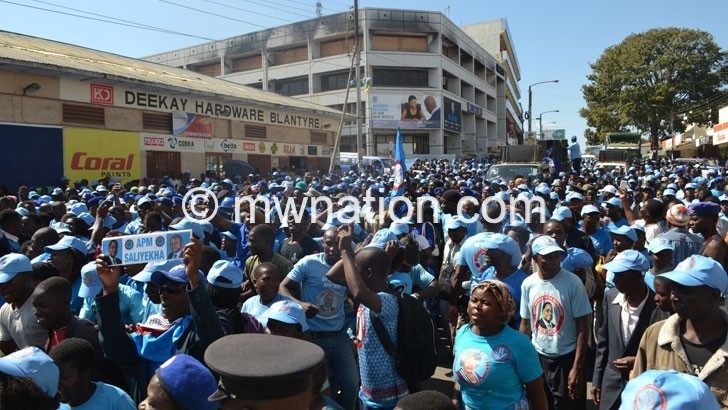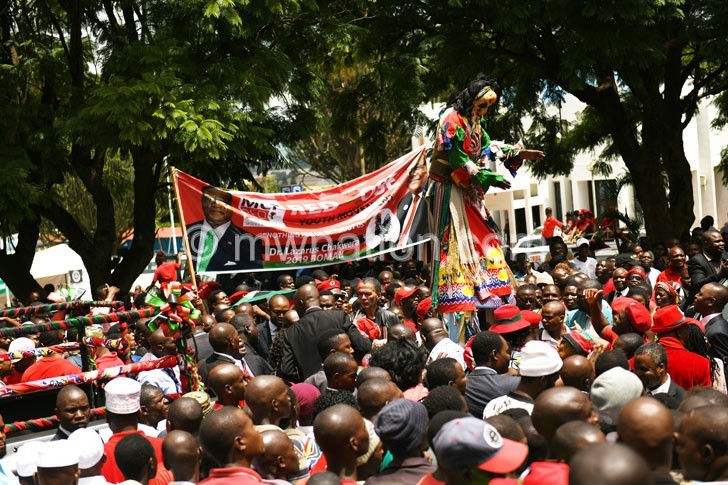DPP, MCP fail to submit audited financial reports
Two main political parties of DPP and MCP risk penalties or losing government funding for failing to submit financial statements on how they used State funds they received in compliance with Political Parties Act.
National Audit Office (NAO) confirmed that Democratic Progressive Party (DPP) and Malawi Congress Party (MCP), whose flag carriers Peter Mutharika and Lazarus Chakwera, respectively, could form the next government if they win the May 19 presidential election, have not submitted their financial statements for auditing despite receiving money from government.

In the 2014 to 2019 Parliament, three political parties—DPP got K120.9 million, MCP received K116.1 million while People’s Party (PP) collected K62.9 million, totalling K300 million.
The political parties were expected to provide financial statements soon after the dissolution of Parliament in March 2019, something they never did.
According to sources in government, in the first year of the 2019-2025 parliamentary term, DPP has already pocketed K23.8 million while MCP has pocketed K21.1 million.

The Political Parties Act states that the Auditor General shall audit the financial records of a political party in respect of the State funds which a political party receives and Section 6(3) of the Public Audit Act says the Auditor General shall audit and examine transactions, books and accounts and other financial records associated with any project, programme and other activity receiving funding in whole or in part from public money.
However, no political party that has received funding from government has ever submitted their books for auditing since 2003 when the Public Audit Act was established.
NAO spokesperson Carol Buliani told Nation on Sunday that no audit has been conducted because political parties’ financial reports have not been made available for audit.
She, however, said those parties represented in and get funding from Parliament are subject to audit because they form part of the institutions that use public funds.
According to the Political Parties Act, DPP, MCP and PP were expected to close their party accounts when Parliament was dissolved last year and submit books and records of account to the Registrar of Political Parties within 14 days and an audited statement not later than the day immediately elections, or repay to the Registrar any unspent balances as at the date when the books and records of account were closed, of all funds that had been allocated to the party. before the date set for the general
The Act empowers the Secretary to the Treasury to suspend the allocation of funds to a political party if the party fails to comply with any requirement of the Political Parties Act.
Parliament spokesperson Ian Mwenye said in an interview that while it is DPP and MCP that are receiving funding in the current Parliament, the three parties of DPP, MCP and PP benefited from government funding.
“In the current Parliament, DPP gets 52.9 percent while MCP gets 47.0 percent. In the previous Parliament, DPP was getting 40.32 percent, MCP 38.71percent while PP 20.97 percent,” he said.
Asked on accountability modalities that Parliament put in place for the government money that is given to political parties, Mwenye referred to the Political Parties Act of 2018.
Section 21 of the Political Parties Act states that a political party which has secured more than one-tenth of the national vote in parliamentary elections shall be entitled to State funding to ensure that, during the life of any Parliament, the party has sufficient funds to continue to represent its constituency.
The Act further says a political party which receives funding from the State shall balance its accounts for that year and produce statements of final accounts within six months after the end of each financial year.
“…and submit the final accounts to the Registrar who shall forward a copy of the accounts to the Auditor General and the Clerk to the National Assembly,” reads the act.
But Mwenye said Parliament has ever asked for financial reports from the political parties and that in 1998, Parliament passed a resolution to withhold political party funding as one way of enforcing accountability.
The Political Parties Act also provides for the parties to disclose any donations, with a monetary value of at least K1 million from an individual donor and of at least K2 million from an organisation within 90 days of its receipt.
But at the moment, the political parties are safe because the Ministry of Justice and Constitutional Affairs under which the Registrar’s office falls is yet to finalise paperwork.
Ministry of Justice and Constitutional Affairs spokesperson Pirirani Masanjala told Nation on Sunday that currently, regulation with the appropriate forms for compliance with Act were drafted and will soon be gazetted.
“Political parties are waiting for the forms to be made available,” he said.
Masanjala, however, said the process of finalising the drafting of implementing regulations, appropriate forms and prescribed fees has taken more time than anticipated.
Ministry of Finance, Economic Planning and Development spokesperson Davies Sado said political parties that receive government money are supposed to be accountable to Parliament; hence, it is Parliament that can act on them if they do not comply with the law.
“Government audits Parliament and if there was something wrong it could be picked through auditing of Parliament,” he said.
When contacted for comment, DPP spokesperson Nicholas Dausi asked for time to get information from relevant authorities within the party, but had not provided the information as we went to press.
MCP spokesperson Reverend Maurice Munthali said he could not get any response from his superiors and was waiting for them to furnish him with information on their expenditure.





